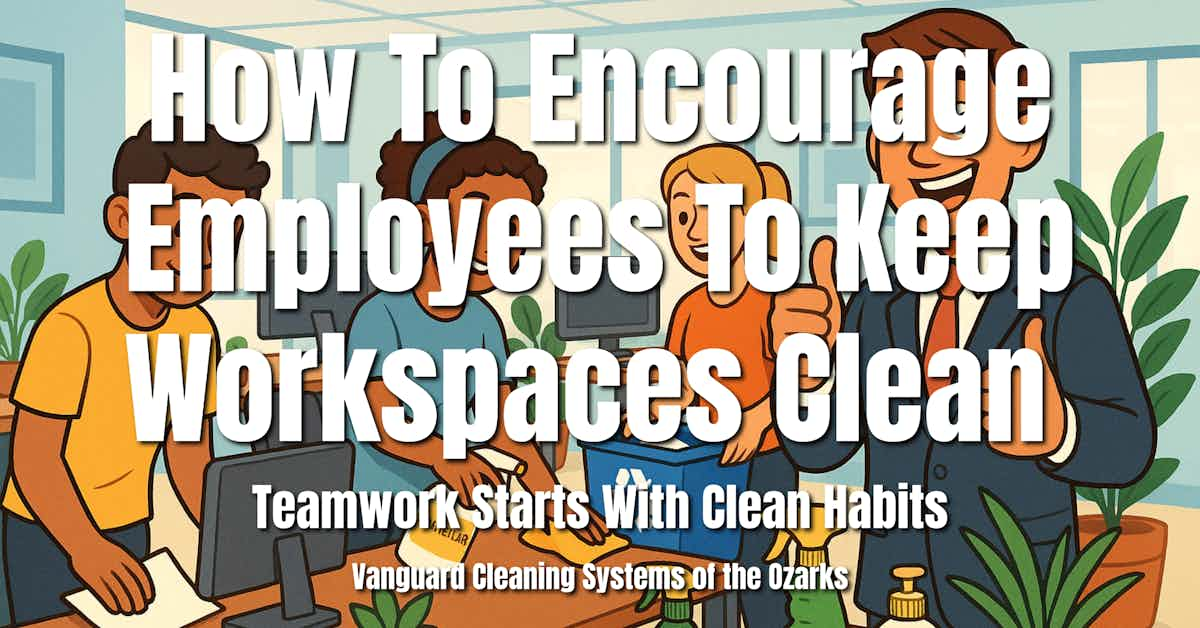Transform your office culture by turning cleanliness from a chore into a shared value every employee owns.

Introduction: Why A Clean Workspace Is A Team Effort
A clean workspace isn’t just about appearance — it’s about creating an environment where focus, health, and professionalism thrive. Yet even with professional janitorial services, office cleanliness ultimately depends on employee habits. Encouraging your team to take ownership of their surroundings can transform cleanliness from a policy into a shared culture.
When cleanliness becomes everyone’s responsibility, offices run smoother, absenteeism drops, and the entire workplace feels more collaborative and energized.
Lead By Example
Employees take cues from leadership. When managers keep their own desks organized and tidy shared areas after use, it signals that cleanliness is part of the company culture — not just a checklist item.
Quick tip: Begin team meetings in clean spaces and thank staff who set positive examples. Small acknowledgments reinforce consistent behavior.
Set Clear Expectations
Without clarity, “clean” means something different to everyone. Create simple visual guides or short checklists that outline what’s expected daily, weekly, and monthly.
- Keep personal work areas clutter-free
- Wipe down keyboards and phones
- Empty trash bins before leaving
- Tidy common areas after meetings
Best practice: Post these reminders in breakrooms or near shared printers where clutter tends to accumulate.
Make Cleaning Convenient
People are more likely to clean up when supplies are easy to find. Stock disinfectant wipes, microfiber cloths, and paper towels in visible, accessible spots around the office.
Bonus: Color-code cleaning materials — for example, blue cloths for desks and red ones for kitchens — to prevent cross-contamination and streamline daily tidying.
Introduce A “Clean Desk” Policy
A clean desk policy doesn’t have to feel restrictive. Framed positively, it improves security, confidentiality, and visual order. Encourage employees to clear personal items, file paperwork, and sanitize their space before heading home.
Pro tip: Host a “5-Minute Reset” reminder near the end of each day. Consistency makes the habit stick.
Recognize And Reward Clean Habits
Positive reinforcement works better than micromanagement. Highlight departments or individuals who consistently maintain organized spaces during meetings or in internal newsletters.
Ideas:
- Monthly “Tidiest Workspace” awards
- Spot recognition in team chats
- Small incentives like gift cards or coffee vouchers
Even symbolic gestures — like a rotating “Clean Champion” desk placard — boost engagement.
Encourage Team Ownership Of Shared Spaces
Breakrooms, meeting rooms, and copy areas often become everyone’s and no one’s responsibility. Assign rotating weekly ownership to small teams. When people know they’re accountable for a shared zone, participation rises naturally.
Example: “Team A” manages the kitchen this week, while “Team B” oversees conference room resets. Next week, they swap.
Provide The Right Tools And Training
Make sure your janitorial staff or cleaning service provides employees with safe, easy-to-use products. Offer short micro-trainings on proper use of wipes, sprays, and sanitizers — especially for tech surfaces.
Tip: Keep Safety Data Sheets (SDS) available for all chemicals in compliance with OSHA standards.
Promote Health And Hygiene Awareness
Cleanliness ties directly to health. Share quick facts about how germs spread through shared keyboards or coffee handles, especially during flu season. When employees understand the “why,” they’re more motivated to clean.
Engagement idea: Post friendly infographics about hand hygiene and cleaning routines in restrooms and breakrooms.
Make Cleanliness Part Of Performance Culture
Integrate workspace maintenance into onboarding and performance expectations. Frame it as a reflection of teamwork and respect rather than a chore.
Manager’s checklist:
- Include cleanliness in onboarding presentations
- Reinforce it during quarterly reviews
- Incorporate cleanliness into team values and core culture documents
Support Clean Habits With Professional Maintenance
Even the cleanest employees can’t manage deep cleaning. Partner with a trusted janitorial provider for recurring services like carpet extraction, window cleaning, or disinfection. Consistent professional support complements daily employee habits and keeps standards high.
How To Build A Cleaning Culture That Lasts
- Start Small: Focus on daily wins — one area or habit at a time.
- Communicate Clearly: Use signage, emails, and short meetings to remind and motivate.
- Be Consistent: Habits form through repetition and visibility.
- Empower Everyone: Make cleanliness a shared value, not just an assigned task.
- Celebrate Progress: Acknowledge clean spaces publicly to reinforce positive behavior.
When employees take pride in keeping their workplace clean, it reflects in every client meeting, every collaboration, and every result.
People Also Ask (PAA)
How do you motivate employees to keep the office clean?
Lead by example, reward good habits, and make cleaning easy with visible supplies and clear expectations.
Why is it important to keep the workplace clean?
Clean workplaces reduce illness, boost morale, and project professionalism to clients and visitors.
How can team accountability improve cleanliness?
Assigning rotating cleaning responsibilities ensures shared ownership and consistency across departments.
What is the best way to encourage daily cleaning habits?
Implement short, repeatable routines like a five-minute daily desk reset at the end of each day.
Frequently Asked Questions (FAQ)
Should cleaning be included in employee responsibilities?
Yes, within reason. Daily tidying and sanitizing of personal and shared spaces build accountability and teamwork.
How do I make employees care about cleanliness?
Connect cleaning to workplace pride, health, and comfort — then reinforce with recognition instead of punishment.
What if employees resist cleaning policies?
Engage them early in shaping the process. Involving staff in setting expectations increases buy-in and cooperation.
Are eco-friendly cleaning products safe for offices?
Yes. Certified green products are effective, non-toxic, and align with sustainable corporate goals.
How often should professional cleaning supplement employee efforts?
Daily tidying should happen in-house, with professional deep cleaning scheduled weekly or monthly depending on usage.
Conclusion: Clean Workspaces Start With Clean Mindsets
Encouraging employees to maintain clean workspaces doesn’t require strict enforcement — it requires leadership, communication, and consistency. When office managers provide the right tools, clear expectations, and recognition for effort, cleanliness becomes part of daily workflow.
A culture of cleanliness is more than appearance; it’s about care, respect, and professionalism that uplifts everyone who enters the space.
Vanguard Cleaning Systems of the Ozarks' franchise-owned custodial service provider business cleans more than 8M sq. ft. weekly, maintaining an industry-topping 95+% of its customer base, year-over-year, and boasting more than 60 5-star Google reviews.
Need more capability from your vendor partners? --Let's talk.
In Oklahoma, dial 918-960-4450
In Arkansas, dial 479-717-2410
In Missouri, dial 417-812-9777
References
Centers for Disease Control and Prevention. (2023). Cleaning and disinfecting your facility: Everyday steps, when someone is sick, and considerations for employers. https://www.cdc.gov
Occupational Safety and Health Administration. (2023). Hazard communication standard and cleaning chemical safety. https://www.osha.gov
U.S. Environmental Protection Agency. (2022). Safer choice standard and green cleaning programs. https://www.epa.gov
International Sanitary Supply Association (ISSA). (2021). Cleaning industry management standard (CIMS) guidelines. https://www.issa.com

